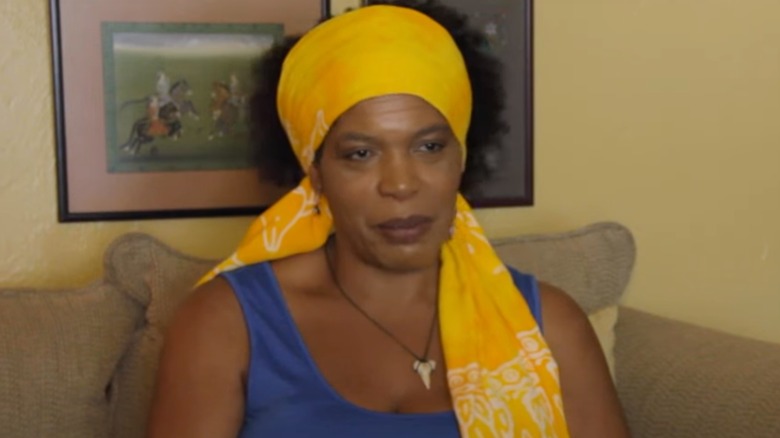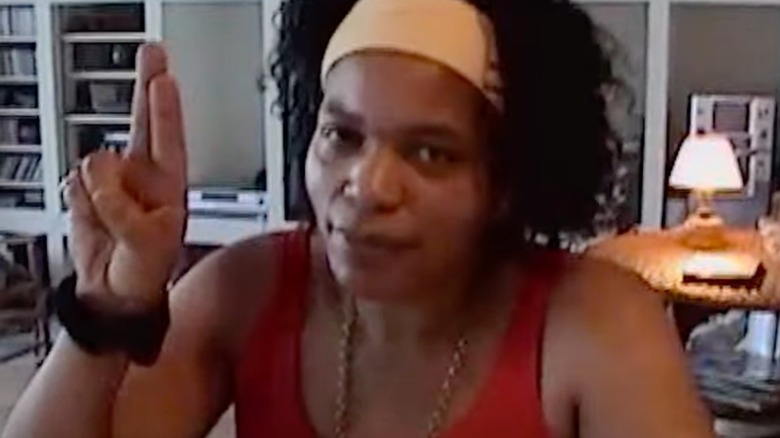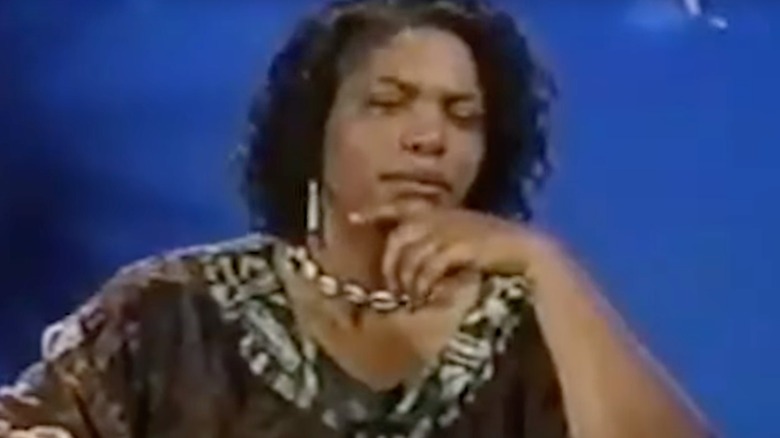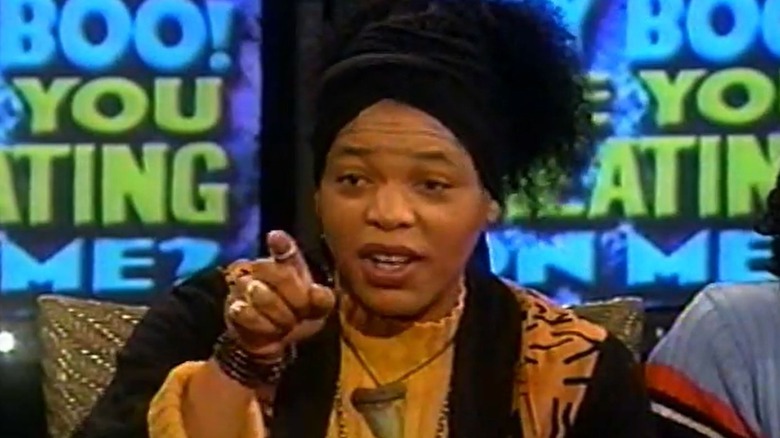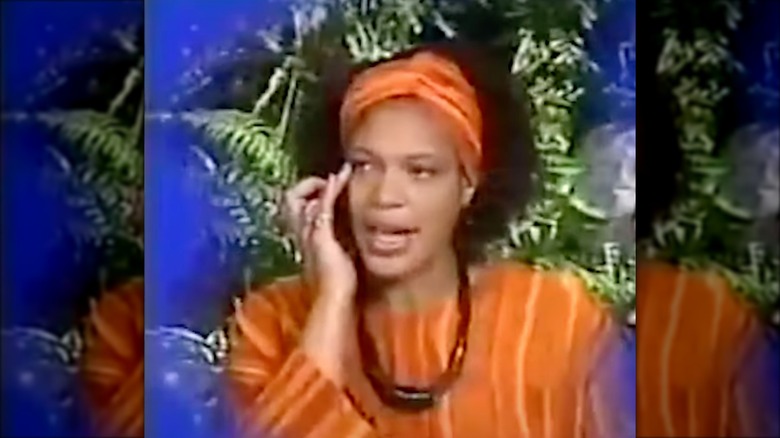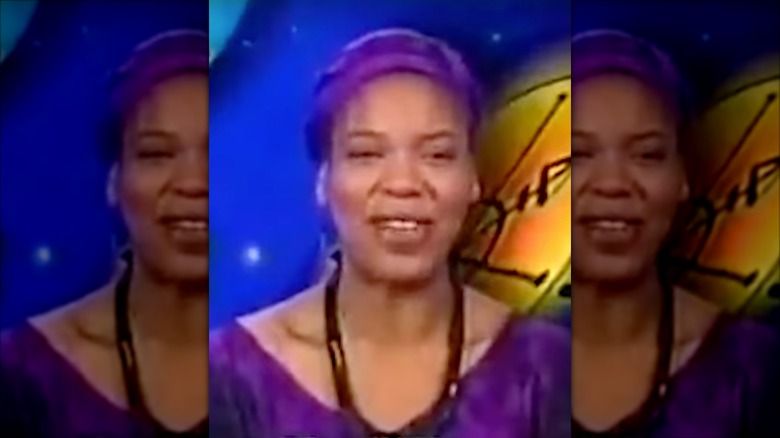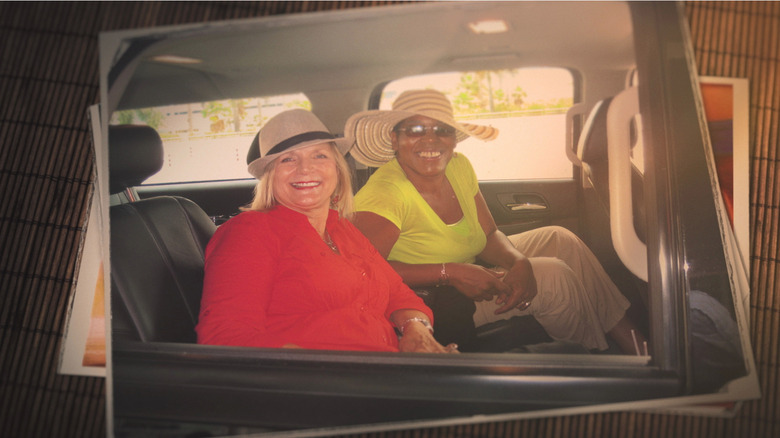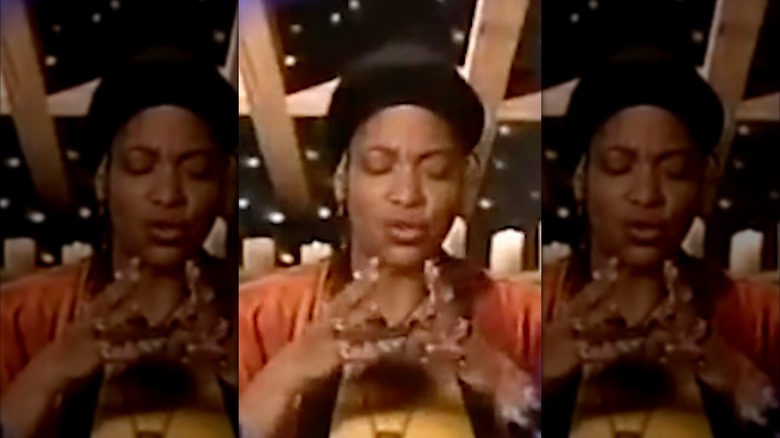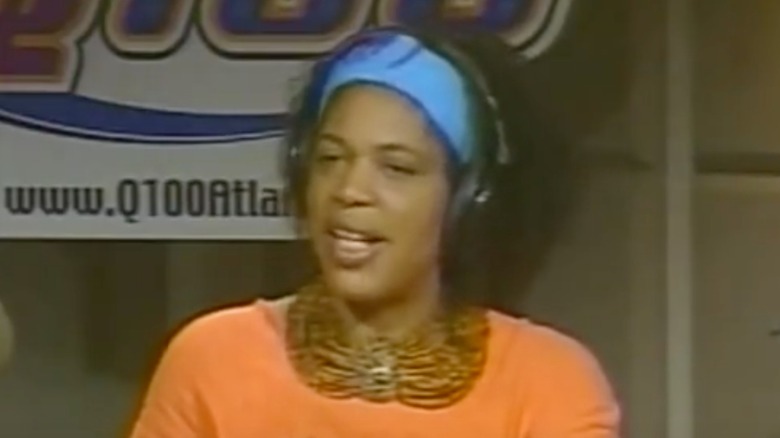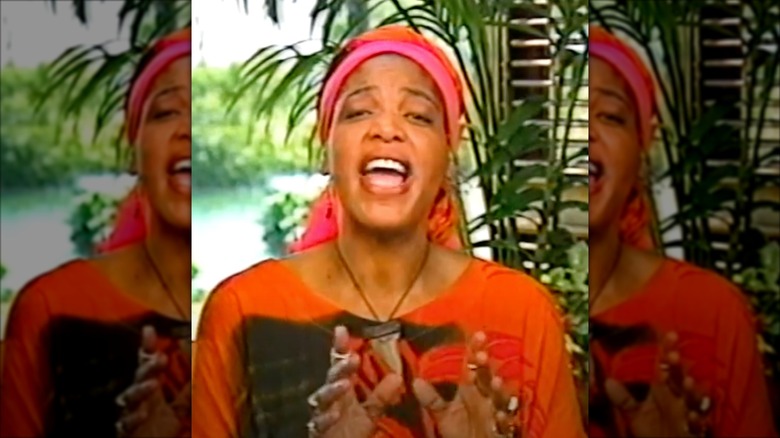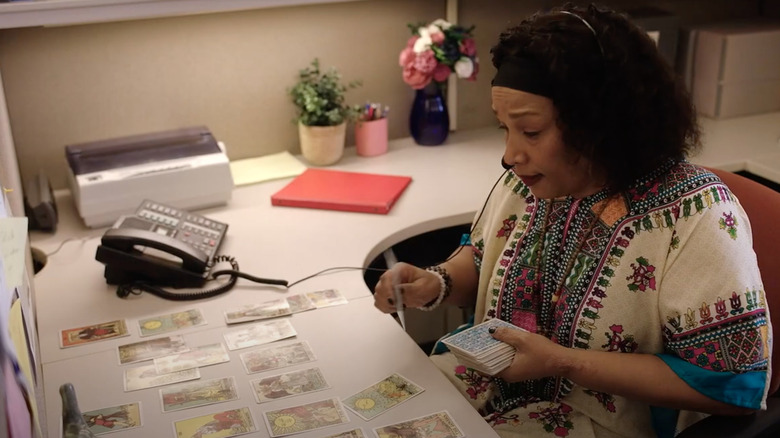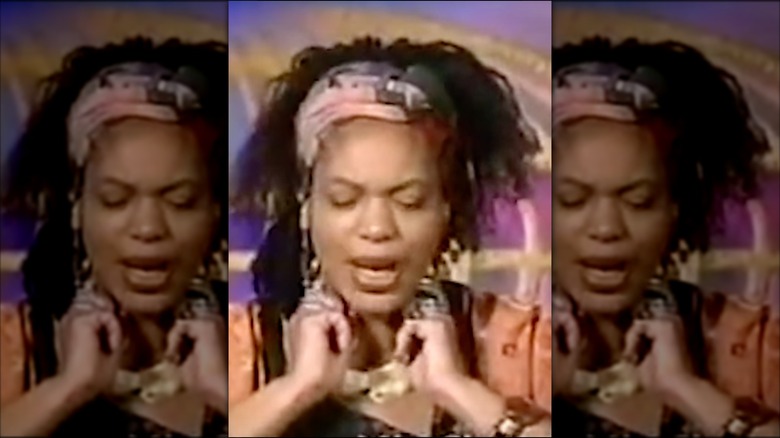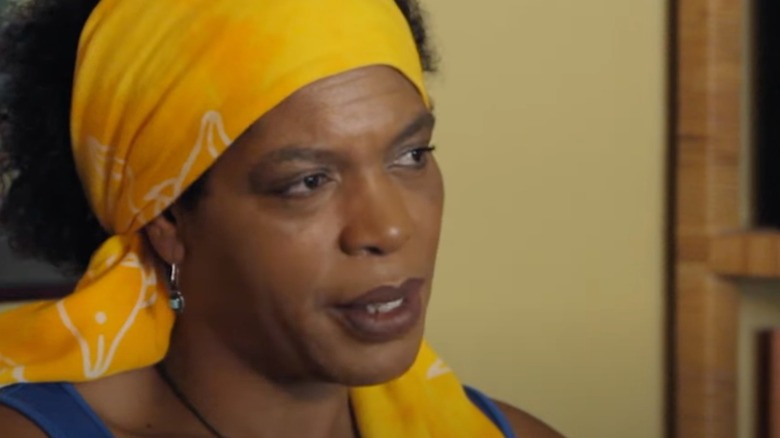What Happened To Miss Cleo? The TV Psychic's Tragic Story Revealed
The following article mentions abuse allegations.
The name Miss Cleo is sure to jog the memory of anyone who tuned into late-night TV during the late '90s and early 2000s. Long before child clairvoyant Tyler Henry became the "Hollywood Medium" and Theresa Caputo's "Long Island Medium" premiered, she was making waves on the small screen with her tarot deck. Born Youree Dell Harris, Miss Cleo rose to national prominence as the face of the Psychic Readers Network, anchoring a barrage of hotline ads that made her one of the most recognizable personalities on cable.
Viewers remember the patois, the minor arcana tarot cards, the knowing look. As the on-air face of the Psychic Readers Network, Miss Cleo's job was to front a 1-900 call-in business that paired callers with paid readers. To her audience, she was a mystical guide who claimed she could unlock the secrets of life and unlock the brain through tarot cards. And she was adamant that her spiritual practice predated the brand. In a candid 2014 Vice interview, she said, "I come from a family of spooky people." Her spiritual journey, she said, began with a Haitian mambo, or priestess, who mentored her for three decades. As she put it, "They refer to me as psychic — because the word voodoo scares just about everybody!'"
Authenticity perhaps sold the vibe, but the contract with the Psychic Readers Network sold the rest. The woman who seemed to know everyone else's future apparently couldn't foresee her own looming troubles — or perhaps she did, but the allure of fame and the contract she'd signed made turning back impossible.
Miss Cleo's named was dragged into FTC's lawsuit against PRN
The Psychic Readers Network (PRN) made a fortune charging customers up to $4.99 per minute for psychic consultations. Infomercials featuring Miss Cleo promised "free" readings, only for callers to quickly find themselves being billed exorbitant amounts. This setup flew under the radar for only so long.
In 2002, the Federal Trade Commission (FTC) filed a lawsuit against PRN, accusing the company of fraudulent practices and false advertising. The owners of the company eventually agreed to a $500 million settlement, most of which was in the form of forgiven customer debts, along with a $5 million fine. The network's collapse came swiftly after. As for Miss Cleo, she was only a hired spokesperson, with no ownership or operational influence.
Addressing the fallout in a 2006 interview with the Advocate, she said, "My family had to deal with the lies and the garbage and the misrepresentations. People really believed that I owned the company." The misperceptions continued to haunt her long after the company's downfall. She added, "According to some articles, I'm still in jail. I never went to jail; I didn't own the company. It's taken ten years for me to move through all of that."
The state of Florida also sued her
While the PRN had to face the FTC's music, Miss Cleo's own legal stars ultimately aligned in her favor. In Florida's pursuit of PRN's deceptive practices, state officials accused her of aiding misleading marketing. Florida officials went a step further and obtained Miss Cleo's birth certificate, which identified her as Youree Dell Harris, born August 13, 1962, at Los Angeles County Hospital to parents from California and Texas, not Jamaica. As Assistant Attorney General David Aronberg told Reuters (via the Sun Sentinel), "We sought this document because the company has gone to great lengths to say that Miss Cleo is a master shaman from Jamaica."
Reflecting on the situation years later, Miss Cleo explained to Vice that the network was behind the character. "They spent a lot of time trying to make me into something that I completely was not," she said. "I speak perfect English. When you grow up in America and you're Caribbean, your parents beat it into you that the only way to succeed is by dropping the patois. My mother was very deliberate about that, and so was my father."
Miss Cleo eventually walked away unscathed financially after PRN agreed to a $44 million settlement that absolved her of personal liability. The agreement, however, ensured her once-ubiquitous commercials were banned from Florida airwaves. "We achieved pretty much all of our goals," Assistant Attorney General Robert Julian told CBS News after the settlement.
While PRN made millions, she was left with barely enough to get by
Without a doubt, the Psychic Readers Network (PRN) raked in staggering sums during its peak. Regulators claimed the operation cleared more than $1 billion, all while Miss Cleo became the face of the brand that sold it. Her face was everywhere, but her reality painted a far less glamorous picture. "They were pulling down—[using] my face, my talent—$24 million a month, for two years straight," she told Vice. For her very first infomercial, she earned just $1,750. She acknowledged a poorly negotiated contract left her on the outside of PRN's massive profits; the math never favored Miss Cleo. Even on the calls she worked herself, the most she could make was around 24 cents a minute.
As she told Vice, "Everybody else thought I had more money than God." To the Advocate, she offered a similar statement: "I'm said to have gazillions of dollars. I wish people would tell me where it is." Despite being a household name and the star of the network, she apparently never amassed a huge fortune.
Yet, even as her financial struggles became public knowledge, Miss Cleo made it clear that her sense of purpose wasn't tied to wealth. In a 2014 interview with Screen Creek, she revealed, "I've turned down five things, including Oprah, in the last month and a half, 'cause they're looking for ratings. I turn down things continually."
Miss Cleo's money problems started with not paying her staff
Before the hotlines and TV stardom, Miss Cleo was juggling budgets as a playwright and producer in Seattle — and she allegedly came up short when the payday arrived. At the Langston Hughes Cultural Arts Center, Miss Cleo, who went by Ree Perris at the time, put on three shows in the mid '90s. However, she reportedly didn't give the cast and crew the money they were owed.
"She made separate arrangements with her performers and cast and crew and apparently did not pay them," David Takami, a Parks and Recreation Department spokesman, said in the Seattle Post-Intelligencer in 2002. He put the gap at only a few thousand dollars — too little, he said, for the city to claw back. Teen development leader Isiah Anderson Jr., who worked with her, told the outlet the check never came but what stung most was that the young people on the project walked away unpaid, too.
Looking back on the time they spent working with Miss Cleo, one former castmate said, "She's brilliant — unfortunately, she's using all that talent and energy not in the best interest of the people around her."
She cited health issues before leaving Seattle abruptly
When confronted about unpaid wages owed to her crew, Miss Cleo said she was suffering from bone cancer; she told others she had sickle cell anemia, a genetic blood disorder that can cause episodes of severe pain. She told the cast and crew she worked with at the Langston Hughes Cultural Arts Center that they'd get paid what they were owed eventually, but explained that she had to deal with her health struggles first. As one cast member told the Seattle Post-Intelligencer, "There was a lot of empathy for this woman; we were all very concerned about her." They also said that Miss Cleo presented herself as in constant agony.
In addition to allegedly never paying the cast and crew, Miss Cleo apparently left town without warning. There's been speculation about whether or not she used the money for medical treatment, but regardless, the promises she once made to her former colleagues reportedly didn't materialize, and the disappointment lingered.
Shortly after she left Seattle, she made her TV debut as Miss Cleo. "Every time I see her on television, I think 'How can someone move on with all of this going on?'" the aforementioned cast member said. "She really violated my trust ... I just want to move on."
The psychic lost her close people after coming out as a lesbian
When Miss Cleo came out publicly as a lesbian in 2006, she told the Advocate she'd long feared the exile that might follow. She said, "The reason it's scary is because in my personal experience, black cultures throughout the world have a more difficult time accepting homosexuality in their family. I have family members who will be shocked." Miss Cleo recounted how, after she came out in the late '80s, some friends literally walked away. In another interview with the Advocate the following year, Miss Cleo shared that some of her relatives were supportive of her coming out, whereas others suddenly weren't talking to her anymore. "Part of it is I don't think they know what to say," she said. "And part of it is they're not sure how much information I'm going to give them!"
In a 2014 interview with IndieWire, Miss Cleo reflected on this period of her life and the challenges she faced on a personal level. "[W]hen I came out publicly in 2006, I lost a large portion of my family. It's so difficult," she said. "Even though it's 2014, not every person you run into is going to embrace you. But at some point in time you have to stand for something or you fall for it."
In the 2022 HBO doc "Call Me Miss Cleo," the TV star's former partner Lou Ann LaBohn (pictured above) reflected on their relationship, which began in the 2000s and ended the following decade. "[Cleo] was a deeply feeling person," LaBohn shared. "I loved all of those things about her. But the [spiritual] gift that she had was a gift and a burden. It was difficult."
She divorced her second wife to protect her daughter
Miss Cleo's second marriage ended in heartbreak and self-reflection as she prioritized her daughter's well-being over her own happiness. She married a man when she was 19, and gave birth to her first daughter before getting divorced at age 21. In the mid '90s, she entered a long-term relationship with a woman that she would later describe as deeply painful.
Speaking to the Advocate in 2007, Miss Cleo alleged that one of her former partners struggled with alcoholism and had become emotionally abusive to her and physically abusive to her youngest daughter. "A lot of people fail to recognize that domestic violence is an issue in our community, and that's something I'm really trying to work on getting out there," she said. Leaving the relationship in 1997 after more than four years together, she reflected on the guilt she felt.
"It was painful for me and my daughter, and I apologized profusely to this little girl with those brown eyes," Miss Cleo said. She also told the outlet that her youngest daughter asked her to stop dating. "I promised her, 'I will not live my life until you are 18,'" she said.
If you or someone you know is dealing with domestic abuse, you can call the National Domestic Violence Hotline at 1−800−799−7233. You can also find more information, resources, and support at their website.
Miss Cleo retreated to a ranch with bodyguards and dogs for safety
Celebrity isn't a security plan, as Miss Cleo came to realize firsthand. When the spotlight moved from her fame to her sexuality, the attention turned invasive. "They'd tell me what was going on in their lives, wanting some direction, and that got intense," Miss Cleo explained to the Advocate in 2006. Her primary focus was always her two kids.
"I'm a mom, gay or straight, and for a mom, it's all about protecting her cubs," Miss Cleo said. To give her children breathing room, she moved from Miami Beach to Davie, a quieter place with ranch land and horses. She feared for her safety, but more than that, she feared for her children. "People would just knock on my door. I had to get a bodyguard; I had to get dogs," she said in the same interview. To some, this might seem excessive, perhaps even indulgent, but for her, she was choosing her family's well-being over fame.
Even in private practice, Miss Cleo couldn't shake the doubters
Even in private practice, the stain of PRN's controversies clung to Miss Cleo. In her 2014 Screen Creek interview tied to "Hotline"— a documentary by Tony Shaff about psychic hotlines — Miss Cleo said she worked by referral only and sent away anyone who doubted her. When asked why she might turn down a client, she pointed to mismatched energy and bad faith, and maintained she'd always give them their money back. The TV star recounted one particularly memorable interaction with a woman who reached out to her.
"So we met at the coffee house," Miss Cleo recalled, "and she sat down and said, 'Well, I went on the internet and I read all of this horrible stuff about you. Can you tell me something first before I give you my money?'" Frustrated by the woman's approach, Miss Cleo responded, "No, why don't you get your a** up and get the hell out the door! I didn't call you, you called me. I didn't chase you down, I didn't entice you." She said she did end up providing the woman with a reading, noting, "Everything I said to her was spot-on."
Not all stories had such positive outcomes, though. "I've had people who have crossed over when they didn't listen to me when I talked to them about their health," she said in the aforementioned interview. "So this task, sometimes it's a blessing, and sometimes it's a burden."
PRN only continued to exert control over the Miss Cleo character
After she became a public figure, Miss Cleo never quite escaped the corporate grip on her own identity. When General Mills revived its French Toast Crunch cereal in 2015, it tapped into '90s nostalgia by featuring the real-life person who played the famed fortune-teller in their promotional campaign — only to find itself entangled in PRN's aggressive intellectual property claims. According to PRN, they had spent over $100 million promoting Miss Cleo and copyrighted the "Miss Cleo Creatives" in 2002. General Mills ultimately pulled the ads.
This wasn't an isolated incident. PRN had become something of a watchdog over the Miss Cleo persona, suing everyone from Benefit Cosmetics to A&E Television Networks and Hillionaire Productions.
The latter case involved a Lifetime movie titled "Miss Cleo: Her Rise and Fall." The made-for-TV flick, which was released in 2024 and starred Robin "The Lady of Rage" Allen as Miss Cleo (pictured above), was deemed defamatory by PRN. The lawsuit was eventually dismissed, and the Lifetime Original Movie is still available to watch. Even so, the legal drama was just another reminder that the persona Miss Cleo made famous wasn't truly hers.
Her GTA: Vice City role sparked a legal battle years after the fact
While PRN's other lawsuits happened almost immediately after the content in question was released, there was one especially noteworthy legal dustup that apparently brewed for many years. In 2017, PRN took aim at Rockstar Games over a character named Auntie Poulet from 2002's "Grand Theft Auto: Vice City." Rockstar hired Youree Dell Harris, the real Miss Cleo, to voice Auntie Poulet. Evidently, the network believed Auntie Poulet was too close to the character of Miss Cleo, and filed a lawsuit 15 years after the game was first released — and a year after Harris' death.
"In particular, [Rockstar] copied Miss Cleo's vibrantly colored caftans and turbans, as well as the patois and mysticism of Miss Cleo, in designing and animating her doppelganger Auntie Poulet," PRN said in a statement (via Mashable). "Auntie Poulet is voiced by Ms. Harris, who uses the same fake Jamaican accent (rather than using a French Creole Haitian accent that would comport with Auntie Poulet's stated background) she used when performing as Miss Cleo."
In a statement to TMZ, a Rockstar spokesperson called the allegations "entirely meritless and completely ridiculous." A separate spokesperson for Take-Two Interactive, Rockstar's parent company, also told Mashable they were prepared to fight the lawsuit.
Miss Cleo's life cut short by colon cancer at 53
Miss Cleo died on July 26, 2016, at the age of 53 due to complications from colorectal cancer. The disease had spread to her lungs and liver after a prolonged battle, and she spent her final days in hospice care. According to Cancer.org, early detection offers hope with a 91% survival rate, but waiting too long can be deadly, with just 13% surviving once it spreads.
Her family's attorney confirmed her death in a statement. "She remained a pillar of strength throughout. She has touched so many lives, both within her family and in the community," he said, per CNN. "She will be dearly missed by us all."
In a late-career turn, Miss Cleo appeared in the 2014 documentary "Hotline," examining the world of telephone psychics. After her death, doc producer Tony Shaff offered CBS News a glimpse into what she was like behind the scenes. "She was smart as a whip and very intuitive," he said. "There was so much negativity surrounding psychic hotlines that she wanted to tell her personal story."
